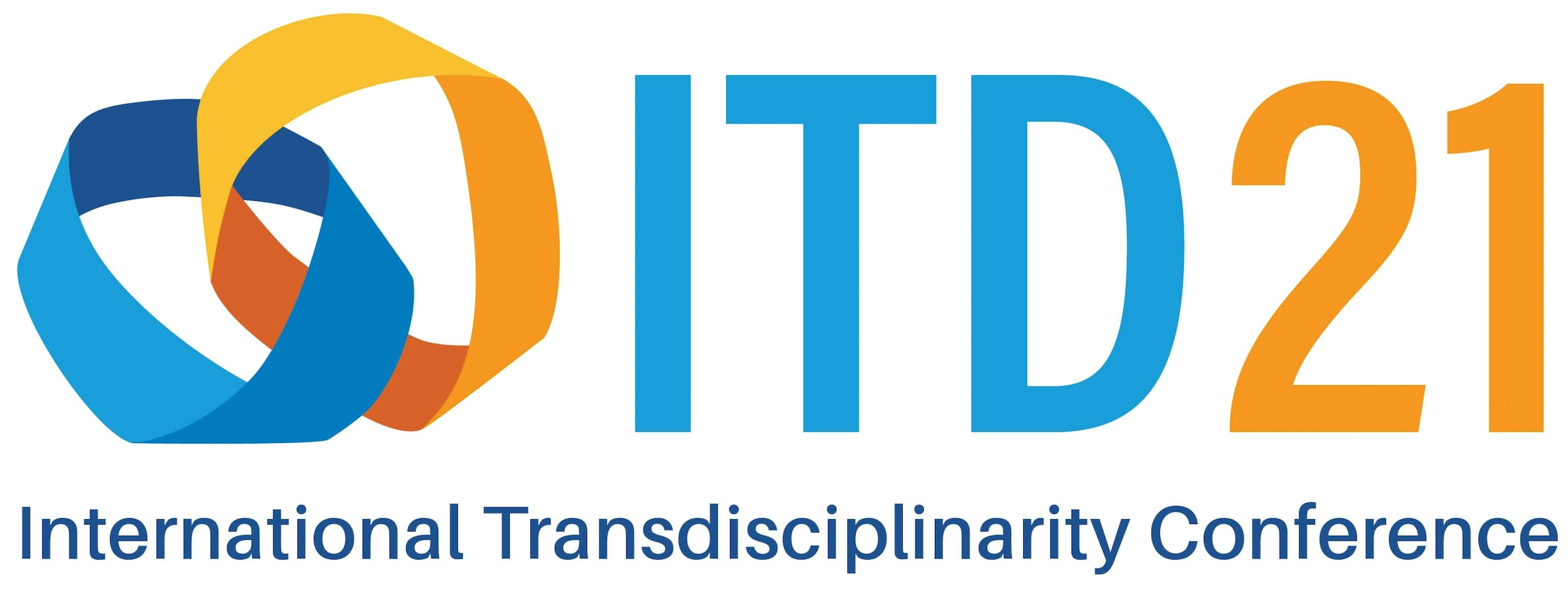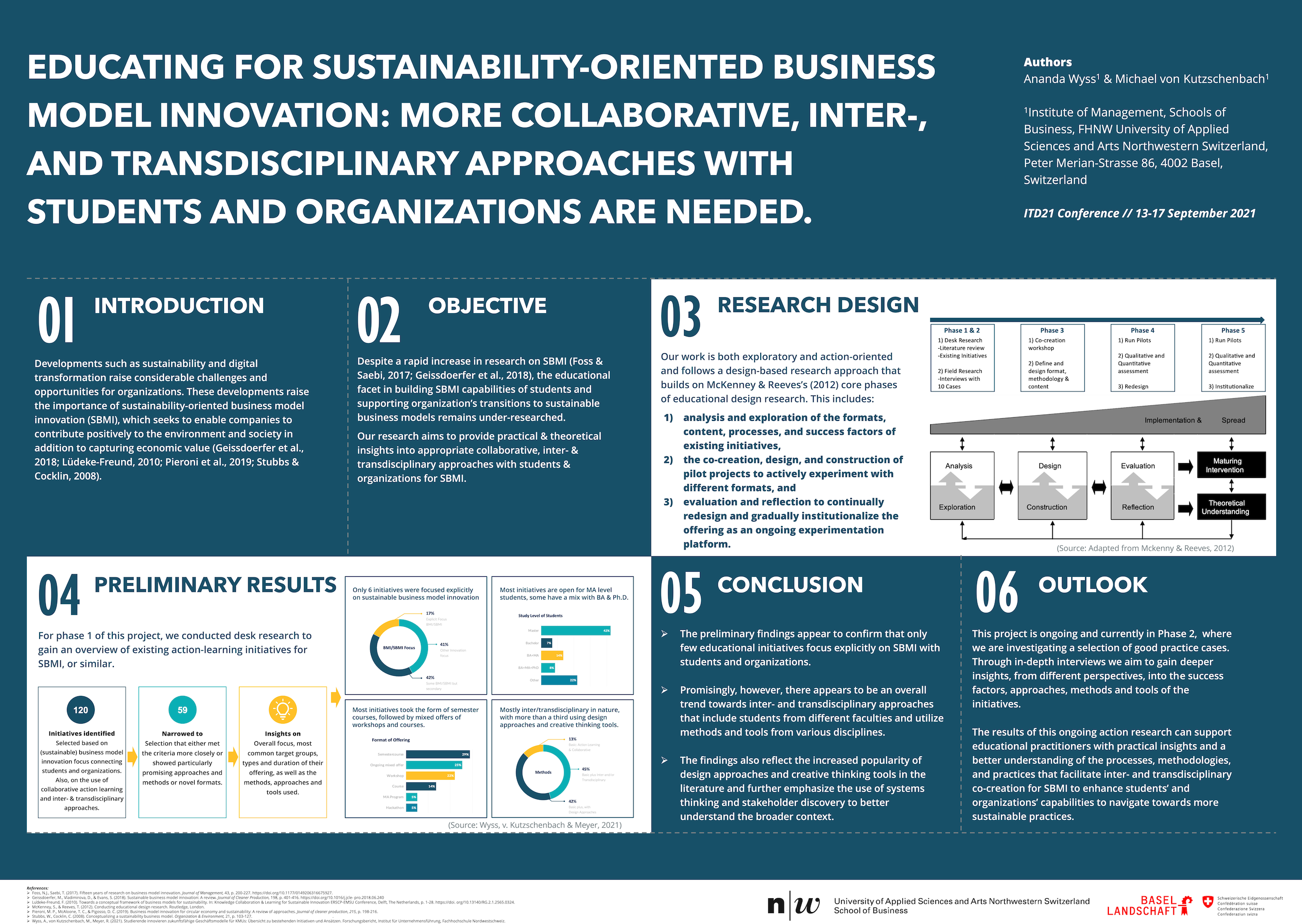Network for Transdisciplinary Research

Main page | Teams & Committees | Call for Contributions | Partner Organisations | Programme | Pre-crafted Contributions
Session 1.1
Educating for Sustainability-Oriented Business Model Innovation: More collaborative, inter-, and transdisciplinary approaches with students and organizations are needed
Ananda Wyss, Michael von Kutzschenbach
Fachhochschule Nordwestschweiz, Switzerland
Our action research project aims to provide theoretical and practical insights into innovative inter- and transdisciplinary educational initiatives for sustainability-oriented business model innovation (SBMI). The project follows a design-based approach and is focused on the Upper Rhein region.
Developments such as sustainability and digital transformation raise considerable challenges and opportunities for organizations. These developments make it imperative for organizations to rethink their business models to not only ensure their competitiveness but also contribute to solving societal issues (Foss & Saebi, 2017; Geissdoerfer et al., 2018). Therefore, the importance of SBMI has increased and strives to enable organizations to operate within planetary boundaries while increasing their long-term success (Steffen et al., 2015). Higher education institutions (HEIs) can help organizations meet these challenges by educating responsible future leaders who see business as a means to transform and serve society (Hoffmann, 2018). Moreover, by providing spaces where imaginations can be stretched, and creative experimentation can take place in collaboration with business. However, although several learning collaborations between HEIs and business exist, only few give specific focus to SBMI. Furthermore, while the literature on Higher Education for Sustainable Development (HESD) contribute greatly to competences and learning methods (Mindt & Rieckmann, 2017; Wiek et al., 2011), research on the practical implementation thereof for SBMI appears weak. Overall, despite the rapid increase in research on SBMI (Foss & Saebi, 2017; Geissdoerfer et al., 2018), the educational facet in building SBMI capabilities of students and supporting organization’s transitions to sustainable business models remains under-researched.
Our work is both exploratory and action-oriented, aiming to provide both theoretical and practical insights. It follows a design-based research approach that builds on McKenney & Reeves’s (2012) core phases of educational design research. This includes, 1) analysis and exploration of the formats, content, processes, and success factors of existing initiatives, 2) the co-creation, design, and construction of pilot projects to actively experiment with different formats, and 3) evaluation and reflection to continually redesign and gradually institutionalize the offering. The project aims to be institutionalized into formal structures as an ongoing experimentation platform and think tank for innovative inter- and transdisciplinary action-learning for SBMI.
The preliminary findings confirm that only few educational initiatives focus explicitly on SBMI and thereby emphasise a need for more research on appropriate educational initiatives for collaborative, inter- and transdisciplinary SBMI with students and organizations. Promisingly, however, there appears to be an overall trend towards inter- and transdisciplinary approaches that include students from different faculties and utilize methods and tools from various disciplines. The findings also reflect the increased popularity of design approaches and creative thinking tools in the literature and further emphasize the use of systems thinking and stakeholder discovery to better understand the broader context.
The results of this ongoing action research can support educational practitioners with practical insights and a better understanding of the processes, methodologies, and practices that facilitate inter- and transdisciplinary co-creation for SBMI to enhance students’ and organizations’ capabilities to navigate towards more sustainable practices.

Educating for Sustainability-Oriented Business Model Innovation: More collaborative, inter-, and transdisciplinary approaches with students and organizations are needed
